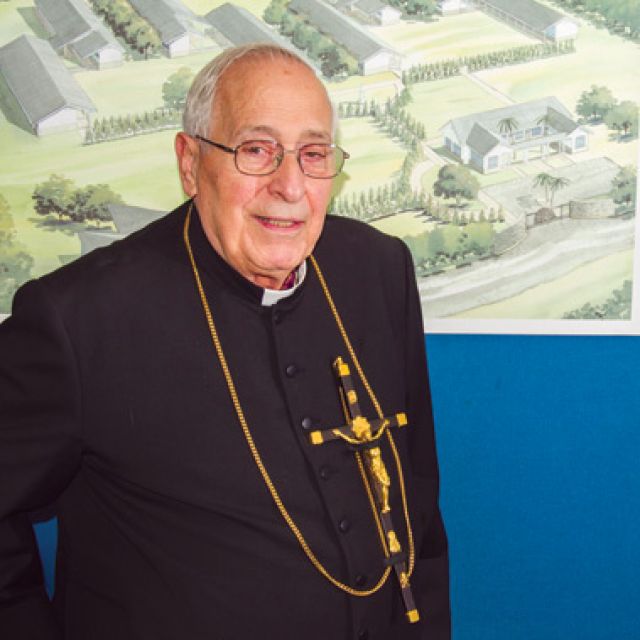Canterucci, a member of the Missionaries of the Precious Blood for more than six decades, began drilling wells in the East African country as part of his order’s Water Project in the 1970s. Six hundred wells later he realized that, as important as water is to impoverished villages, what they really needed was education.
“Having uplifted the people over these years physically (and) spiritually the only conclusion that I see to bring them out of this state of life, this Third-World existence, is education,” said Canterucci, 84. “Aid without education is just hopeless. It doesn’t work. If the people are really going to come into the 21st century they need to be educated as well.”
So when Canterucci reached his 50th anniversary as a Precious Blood brother he used his celebration to raise about $300,000 to begin construction of a $1 million elementary school. The cornerstone of St. Gaspar Primary School was laid in 2003 and four years later classes began. This June the school celebrated its first graduating class.
Canterucci’s sights are now set on building a high school. Construction has begun but a funding shortage means hitting the 2015 completion target is problematic, he said.
“It is difficult fundraising now,” he said. “With the troubles in the world, corruption in every sector of our lives, the Church included, some people I guess are reluctant to give.
“Hopefully this will change with Pope Francis’ coming into the picture. He is kind of turning us around to do and be who we are supposed to be — just normal human beings who care for one another.”
Canterucci needs about $2.5 million to build the school but is more than $1 million short. He also wants to raise between $6-$8 million to create a cash reserve to cover the $40,000 monthly operating budget of the two schools.
“It is not just my crazy idea to do what we are doing,” he said. “It is what’s needed to be done. We started a process with the people and water, and you just can’t stop (helping) all of a sudden.”
Canterucci is not only concerned with formal classroom training for children.
“We have trained Tanzanians to maintain the windmills,” which power the wells, said Canterucci. “We also trained Tanzanians to drill. I must say the five, the team of drillers, they treat the equipment better than they do their wives. They certainly have an understanding for water and the function of it.”
Other locals have been trained to be electricians, carpenters and plumbers.
Annually since 1976 Canterucci has taken groups of Canadian youth to Tanzania to assist with the project and broaden their understanding of the world.
“With the cost of the trips, the airfares and everything, I could probably have put in another water system in a village,” he said. “But I have 17 to 20 kids that have an education that you are not going to buy, even at the best universities. They have a different outlook on life. I haven’t seen one of the kids . . . not come back different.”
Canterucci, who received the 2013 Governor General’s Caring Canadian Award, said several of his young protégées have returned to Tanzania as adult members of the Water Project. One such example is Anastasia Schwingshackl. Born in Kenya, she moved to Canada at 13. While attending high school she went to Tanzania with Canterucci.
“When I was in high school my mission was to go to work in Africa,” she said. “I just always felt that I had a calling to go back to work in Africa.”
Following another trip in 1986, Schwingshackl settled into a nursing career in Canada — until a phone call changed her life.
“When Bro (brother Canterucci) called me and said there was a position opened I jumped at it,” said Schwingshackl.
She went to work as a midwife at a hospital built by the Precious Blood missionaries but soon found herself serving as the Tanzanian office manager for the Water Project. She stayed for 19 years before moving to Italy with her husband, also a former missionary, who she met in Tanzania.
She admits a missionary life in Africa isn’t for everyone, but says all youth could learn something important from a trip to Tanzania with Canterucci.
“It’s a great opportunity for young people to see another culture so that they don’t only think of themselves,” she said. “I personally learned a lot there. People there have nothing and they are so kind and generous and I think that is one of the biggest things that I learned there .... (and) I think that is probably the reason that I stayed.”
Canterucci said that raising money and identifying future leaders are vital to the continuation of the Water Project and the education of Tanzanian youth. But he’s not concerned about his work being discontinued when he’s gone. That’s because, he says, at the end of the day it isn’t his work to worry about.
“The work I am doing is not mine,” he said. “It is God’s work and He knows how to keep it going.”

